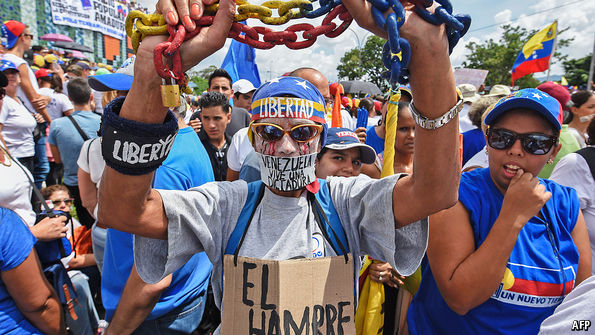A lurch towards dictatorship, massive protests and no sign of regime change

THIS time, the protests were nationwide. From Maracaibo in the west to Ciudad Guayana in the east, hundreds of thousands of Venezuelans filled the streets to call for an end to the authoritarian left-wing regime led by Nicolás Maduro. More than 100 people were arrested and one policeman in the state of Miranda died. “This government is never going to leave through an election,” said María Gil, a masseuse who joined the throng in Caracas, Venezuela’s capital. “All that is left is protest.” David Mujica, a street trader, agreed that voting “changes nothing”.
Both protesters branded Mr Maduro a “dictator”, a term Venezuelans have been using more freely after the events of the past fortnight. On October 21st, days before voters were to go to polling stations to register their signatures in favour of holding a referendum to recall the president from office, the process came to an abrupt halt. Five criminal courts in five separate states declared that the conduct of an earlier stage in the process—the submission of signatures from at least 1% of the electorate—had been fraudulent. That is nonsense. The opposition submitted 2m signatures in April, ten times the minimum number. The electoral council, which is supposedly independent but kowtows to the regime, had said that 1.4m of those were valid. The five courts did not explain their reasoning.
The government, which is presiding over the deepest recession in Venezuela’s history and acute shortages of food and medicine, has given up all pretence that it will work with any institution that it does not control. It has ignored the national assembly, which is dominated by the opposition. The legislature still summons ministers to explain plans or provide information, but none ever appears. On October 14th, the president passed next year’s government budget without sending it to the assembly, in violation of the constitution. A compliant supreme court, stuffed with pro-government cronies, waved it through. The court has vetoed every law that parliament has passed this year.
Now the assembly is in open revolt. On October 23rd, after the suspension of the referendum, it met in emergency session to declare that a coup had taken place. A pro-government mob entered the parliament building during the meeting, in a clumsily stage-managed attempt to demonstrate to television viewers that a popular “revolution” continues. Some of the intruders were armed. The assembly has since declared that the president may have abandoned his duties and should therefore stand trial. No one thinks this will happen. The constitution does not explicitly provide for the possibility of such a trial, and Mr Maduro would not show up if it did.
The squelching of the recall referendum is a signal that the regime has made a decision about how to deal with the crisis. Some in the socialist chavista movement—founded by Mr Maduro’s charismatic predecessor, Hugo Chávez—are thought to have argued for allowing a recall vote in 2017, past the date when it would have triggered a fresh presidential election. If Mr Maduro had lost next year, a near certainty given his 20% approval rating, the vice-president, currently Aristóbulo Istúriz, would have taken over from him.
Hardliners privately argued for holding no referendum at all. The governors of the five states whose courts blocked it are thought to be among their number. That decision seems to mean that they intend to stick with Mr Maduro, at least until the next presidential election in 2018. Some now wonder whether that election will be held.
Talk is expensive
Mr Maduro’s favourite word at the moment is “dialogue”, robotically invoked in his interminable speeches. He paid a surprise visit on October 24th to the pope, who has been trying to arrange a meeting between the government and the opposition. The effort seems to be working in the government’s favour. A senior opposition official, Jesús Torrealba, appeared at an awkward photo-call alongside a representative of the ruling party and a papal envoy. The government suggested that they had reached an agreement to begin formal talks at the end of October.
That was an exaggeration. Most opposition leaders have no intention of sitting down with a regime they regard as illegal. Henrique Capriles, who nearly defeated Mr Maduro in a presidential election in 2013, has made clear his refusal to attend any talks. “We are fighting against the devil,” he says. The episode has been a gift to Mr Maduro, who can now present himself as open to dialogue, and the opposition as divided and intransigent.
The opposition has now responded by issuing an ultimatum. If Mr Maduro fails to restart the recall process, it will call for a march on the presidential palace on November 3rd. But there is little prospect that protest alone can dislodge the regime.
The stance of the army, long the arbiter of power, remains crucial. The opposition is trying to sow dissension by calling on the armed forces to uphold the constitution. But the tactic is unlikely to succeed. Underpaid junior officers might be receptive, but the top brass, which controls most sectors of the economy, will not be.
On October 25th Vladimir Padrino López, the defence minister, delivered a rare television speech, dressed in full combat uniform. The army, he said, has no political allegiances. But then he showed just how firmly it backs the bankrupt regime, ending his address by paying homage to Chávez, who devised the economic policies that have impoverished the country. “Long live Chávez,” he cried, fist raised high.

No comments:
Post a Comment